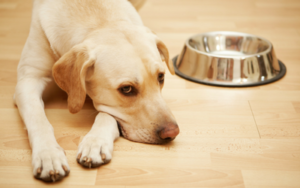What is diarrhea?
Diarrhea is the passage of unformed or loose stools, usually in increased volume and/or increased frequency. Diarrhea is not a disease but rather a symptom of many different diseases. Diarrhea associated with minor conditions can often be resolved quickly with simple treatments.
“Diarrhea may be the result of serious or life-threatening illnesses…”
However, diarrhea may be the result of serious or life-threatening illnesses such as organ system failure or cancer. Even diarrhea caused by mild illnesses may become serious if treatment is not begun early enough to prevent severe fluid and nutrient losses.
What causes diarrhea?
Diarrhea is the result of increased speed of passage of fecal material through the intestine, combined with decreased absorption of water, nutrients and electrolytes. If the main symptom of illness in your dog is diarrhea, a relatively simple problem such as an intestinal infection from bacteria, viruses, coccidia or intestinal worms may be the cause. In dogs, dietary indiscretion (such as a change in diet or eating garbage or other offensive or irritating materials) is a common cause of acute (sudden) diarrhea. Stress, especially following travel, boarding or other changes in environment, can also cause acute diarrhea.
However, diarrhea can also be a symptom of a more serious underlying disorder such as allergies, bacterial or viral infections, inflammatory intestinal disease, organ dysfunction, or other systemic illness.
How serious is diarrhea in dogs?
 The seriousness of diarrhea depends on how long the diarrhea has persisted and how many other symptoms accompany the diarrhea. If your dog has severe bloody diarrhea, or is showing more generalized signs of illness such as weakness, fever, vomiting, abdominal pain or loss of appetite, or if dehydration accompanies the diarrhea, the cause may be more serious. For example, diarrhea is one of the first symptoms seen in parvovirus, a viral infection that can cause life-threatening illness in susceptible dogs.
The seriousness of diarrhea depends on how long the diarrhea has persisted and how many other symptoms accompany the diarrhea. If your dog has severe bloody diarrhea, or is showing more generalized signs of illness such as weakness, fever, vomiting, abdominal pain or loss of appetite, or if dehydration accompanies the diarrhea, the cause may be more serious. For example, diarrhea is one of the first symptoms seen in parvovirus, a viral infection that can cause life-threatening illness in susceptible dogs.
How is the cause of diarrhea determined?
The nature of the diarrhea, such as its color, consistency, smell and frequency, are important in helping determine the cause. Your veterinarian will usually ask you to bring a representative sample of fresh fecal material with you to your appointment. You may also be asked to provide answers to a series of questions (see the handout “Diarrhea, questionnaire”).
“Diarrhea is the only symptom, a minimum number of tests are performed…”
If diarrhea is the only symptom, a minimum number of tests are performed to rule out certain parasites and infections. If diarrhea is severe or associated with several other clinical signs, your veterinarian will perform a series of tests in order to reach a diagnosis and to determine how sick your dog has become as a consequence of the diarrhea. These tests enable your veterinarian to treat your dog appropriately.
Diagnostic tests may include microscopic fecal evaluation, abdominal radiography (x-rays) with or without barium, blood tests, fecal cultures, biopsies of the intestinal tract,endoscopy, ultrasound and exploratory abdominal surgery.
What is the treatment for diarrhea?
Once the diagnosis is known, specific treatment will be tailored to the underlying problem and may involve medication or dietary treatment.
“Conservative medical approach allows the body’s healing mechanisms to correct the problem.”
For healthy adult dogs with simple acute diarrhea, your veterinarian may initially recommend a conservative approach rather than an in-depth diagnostic work-up. Conservative treatment will often involve withholding all food for 12-24 hours to allow the intestinal tract to rest; access to water must not be restricted during this time. After this fast, an easily digested diet will be prescribed for a few days; this diet may either be a commercial product or a bland, home-prepared combination of cooked rice or pasta and boiled chicken. This conservative medical approach allows the body’s healing mechanisms to correct the problem. As the stools return to normal, you can gradually reintroduce your dog’s regular food by mixing it in with the special diet for several days.
Anti-diarrheal or deworming medications may be prescribed in some cases, while other cases may be treated with drugs to control the motility (movement) of the intestinal tract or drugs that relieve inflammation. However, you should only give your pet one of these products if your veterinarian specifically prescribes it.
“Severe or prolonged diarrhea can result in significant dehydration and metabolic disturbances due to fluid loss and your pet may require hospitalization for intravenous fluid therapy.”
If your pet is not improving within two to four days, further tests or more aggressive treatment may be necessary. Severe or prolonged diarrhea can result in significant dehydration and metabolic disturbances due to fluid loss and your pet may require hospitalization for intravenous fluid therapy or other, more intensive, treatments.
In all cases, if your dog does not improve within two to four days, a change in medication or further tests may be necessary.
What is the prognosis?

The prognosis depends upon the severity of the diarrhea, as well as the specific diagnosis and the dog’s response to treatment. Most cases of simple diarrhea will make a full recovery, while dogs with chronic diarrhea may require dietary management or medication to keep the condition under control.
This client information sheet is based on material written by: Ernest Ward, DVM
© Copyright 2009 Lifelearn Inc. Used and/or modified with permission under license.
